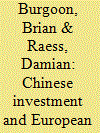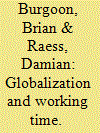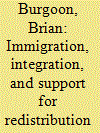|
|
|
Sort Order |
|
|
|
Items / Page
|
|
|
|
|
|
|
| Srl | Item |
| 1 |
ID:
129646


|
|
|
|
|
| Publication |
2014.
|
| Summary/Abstract |
The rapid increase in Chinese foreign direct investment (FDI) into Europe raises important questions about the implications of such for workers and organized labor in Europe: (1) does Chinese FDI flow more or less to regulated labor markets than do other investment sources?; (2) what are the strategies of works councilors and union representatives in dealing with real or expected investment from China?; and (3) how do individual workers view the propriety of Chinese FDI given China's low-wage, labor-unfriendly profile in the global economy? Quantitative and qualitative data on Chinese FDI, individual opinions about China and globalization, and on strategies of labor representatives provide some leverage to preliminarily answer these questions. First, Chinese FDI does not seem to be more (or less) focused on investing in the least regulated labor markets than other sources of FDI. Second, interviews with works councilors and union representatives in Germany, France and the Netherlands affirm a cautiously optimistic view of Chinese investors as no more or less threatening to organized labor than other investors. Third, analysis of attitudes about Chinese and European interests in managing globalization suggest that less-skilled, more vulnerable, pro-labor-union workers in Europe tend to be more rather than less enthusiastic about Chinese management than their fellow citizens. These patterns suggest a surprising, if tentative, embrace by workers and their representatives in Europe of that investment.
|
|
|
|
|
|
|
|
|
|
|
|
|
|
|
|
| 2 |
ID:
092869


|
|
|
|
|
| Publication |
2009.
|
| Summary/Abstract |
This article challenges popular wisdom that economic globalization uniformly increases working time in industrialized countries. International investment and trade, they argue, have uneven effects for workplace bargaining over standard hours and over work-time flexibility, such as use of temporary or fixed work contracts. The authors explain how such globalization will tend to more substantially decrease standard hours than it does work-time flexibility. And they explain how works councils and union-led collective bargaining alter the way globalization affects both aspects of working time.The analysis of German enterprise data supports these expectations. Measures of globalization diminish standard working hours but yield more temporary work, fixed-contract work, and flexible working arrangements. Works councils and collective bargaining, however, mediate these effects in contrasting ways. Among enterprises without works councils or collective agreements globalization triggers more standard hours, but among firms with such representation globalization triggers fewer hours. With respect to flexibility, however, globalization increases use of temporary or fixed-term contracts more strongly where works councils or collective bargaining are present than when they are not. In short, economic openness has uneven consequences for working time, and firm-level labor representation channels those consequences in ways that highlight political agency in how people respond to globalization.
|
|
|
|
|
|
|
|
|
|
|
|
|
|
|
|
| 3 |
ID:
132505


|
|
|
|
|
| Publication |
2014.
|
| Summary/Abstract |
Immigration poses individual or collective economic risks that might increase citizen support for government redistribution, but it can also generate fiscal pressure or undermine social solidarity to diminish such support. These offsetting conditions obscure the net effects of immigration for welfare states. This article explores whether immigration's effects are mediated by the economic and social integration of immigrants. Integration can be conceptualized and measured as involving the degree to which immigrants suffer unemployment rates, depend on welfare-state benefits, and harbor social attitudes similarly to the native population. Such integration may alter how immigration reduces solidarity and imposes fiscal and macroeconomic pressures, but does not much alter how immigration spurs economic risks for natives. Where migrants are more integrated by such measures, immigration should have less negative or more positive implications for native support for government redistribution and welfare states than where migrants are less integrated. The article explores these arguments using survey data for twenty-two European countries between 2002 and 2010. The principal finding is that economic integration, more than sociocultural integration, softens the tendency of immigration to undermine support for redistributive policies.
|
|
|
|
|
|
|
|
|
|
|
|
|
|
|
|
| 4 |
ID:
068868


|
|
|
| 5 |
ID:
129640


|
|
|
|
|
| Publication |
2014.
|
| Summary/Abstract |
Though still a small percentage of the total stock of Foreign Direct Investment (FDI) present in European countries, FDI coming from China has risen dramatically in the European Union (EU) since 2009. This introduction to the special issue on "The Politics of Hosting Chinese Investment in Europe" examines the political fears aroused by this recent surge and by the prospect of continued Chinese direct investment in European economies. After surveying patterns of Chinese investment in the EU, this introduction asks what is distinctive about the potential economic and political consequences of Chinese FDI and lays out the argument for and against treating Chinese FDI as sui generis
|
|
|
|
|
|
|
|
|
|
|
|
|
|
|
|
| 6 |
ID:
184256


|
|
|
|
|
| Summary/Abstract |
The West is turning inward. Donald Trump’s presidency, Britain’s decision to leave the European Union, and the spread of populist parties in Europe are the most visible signs of this retreat. The shift is not as recent as these examples suggest, however. Drawing on an array of cross-national data for twenty-four industrialized democracies and hundreds of political parties in those democracies, we show that domestic support for liberal internationalism has been receding for twenty-five years across the West. We show that since the end of the Cold War a large and widening gap has opened up between Western democracies’ international ambitions and their domestic political capacity to support them. As Western governments came to rely increasingly on economic globalization, institutionalized cooperation, and multilateral governance, mainstream parties that backed these efforts lost electoral ground to parties on the radical-left and increasingly, the anti-globalist radical-right that have been the vehicles of the current backlash. We discuss the implications of these trends for the Western liberal international order and the strategies now on offer to repair it.
|
|
|
|
|
|
|
|
|
|
|
|
|
|
|
|
|
|
|
|
|